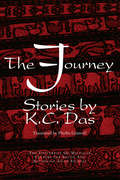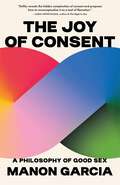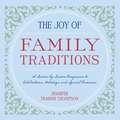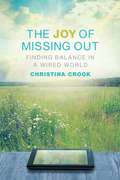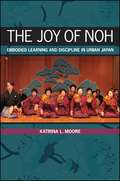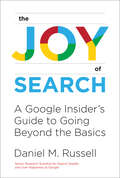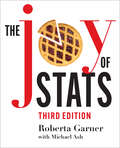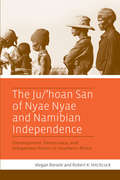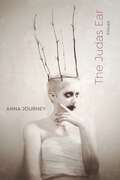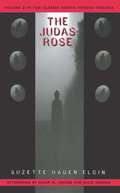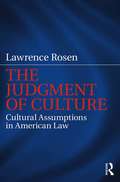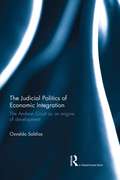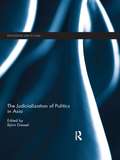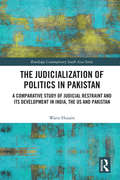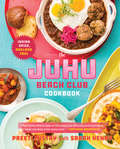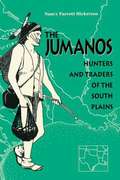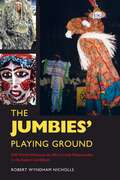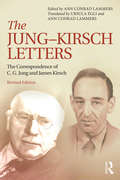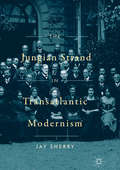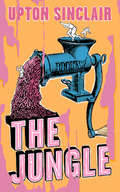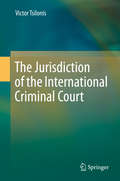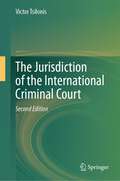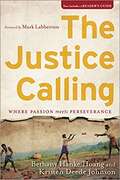- Table View
- List View
The Journey: Stories by K. C. Das (Michigan Papers On South And Southeast Asia #48)
by K. C. DasK. C. Das is deservedly one of the most celebrated writers in India today. He writes primarily in Oriya, the language of his native state of Orissa, where he was born in 1924. A civil servant by profession, Das pursued a second career as a writer of stories, poems, and essays. The stories in this collection take place in an urban setting. The characters are mainly middle class, making them more accessible to North American readers than other examples of contemporary Indian fiction. These are not simple stories. They are about “divides,” about gaps between realities and imagination. In complex shifts between direct dialogue, interior monologue, and interior or imagined dialogue, Das lovingly but mercilessly exposes his characters' thoughts, self-deceptions, and the games they play with each other. These are stories about human weaknesses, the fallibility of human relationships, and the strategies we adopt to cope with our failures. They are about coming to terms with unpleasant, sometimes shocking truths about ourselves and others.
The Joy of Consent: A Philosophy of Good Sex
by Manon Garcia“From the bedroom to the classroom to the courtroom, ‘consent’ is a key term in our contemporary sexual ethics. In this timely reexamination, Manon Garcia deftly reveals the hidden complexities of consent and proposes how to reconceptualize it as a tool of liberation.”—Amia Srinivasan, author of The Right to SexA feminist philosopher argues that consent is not only a highly imperfect legal threshold but also an underappreciated complement of good sex.In the age of #MeToo, consent has become the ultimate answer to problems of sexual harassment and violence: as long as all parties agree to sex, the act is legitimate. Critics argue that consent, and the awkwardness of confirming it, rob sex of its sexiness. But that objection is answered with the charge that opposing the consent regime means defending a masculine erotics of silence and mystery, a pillar of patriarchy.In The Joy of Consent, French philosopher Manon Garcia upends the assumptions that underlie this very American debate, reframing consent as an ally of pleasure rather than a legalistic killjoy. In doing so, she rejects conventional wisdom on all sides. As a legal norm, consent can prove rickety: consent alone doesn’t make sex licit—adults engaged in BDSM are morally and legally suspect even when they consent. And nonconsensual sex is not, as many activists insist, always rape. People often agree to sex because it is easier than the alternative, Garcia argues, challenging the simplistic equation between consent and noncoercion.Drawing on sources rarely considered together—from Kantian ethics to kink practices—Garcia offers an alternative framework grounded in commitments to autonomy and dignity. While consent, she argues, should not be a definitive legal test, it is essential to realizing intimate desire, free from patriarchal domination. Cultivating consent makes sex sexy. By appreciating consent as the way toward an ethical sexual flourishing rather than a legal litmus test, Garcia adds a fresh voice to the struggle for freedom, equality, and security from sexist violence.
The Joy of Family Traditions: A Season-by-Season Companion to Celebrations, Holidays, and Special Occasions
by Jennifer Trainer ThompsonWhen a special activity evolves into a tradition within a family, it creates meaning, connection, and community and makes common occasions more momentous and memorable. Establishing a sense of stability and shared history has never been more important to parents than it is today, as families become more fractured and scattered. THE JOY OF FAMILY TRADITIONS offers more than 400 fresh ideas and creative approaches to cultivating birthday, anniversary, holiday, and other rite-of-passage and seasonal traditions that strengthen personal bonds and reflect a family's individual style, spirituality, and values. Inspires and instructs families on how to create, personalize, adapt, and preserve relevant traditions that reflect how we live today. Explores the historical, cultural, and often quirky origins of holidays, customs, and milestones, both uncommon and familiar. Includes holidays, holy days, annual events, once-in-a-lifetime occasions, and personal celebrations. Reviews"A lovely new book that pays tribute to hundreds of celebrations from around the world and offers new ideas for marking important occasions."--Pregnancy Magazin "Be inspired to preserve, personalize and create meaningful holiday and year round traditions with the more than 400 multi-cultural activities found in The Joy of Family Traditions."--Senior Wire News Service "...read The Joy of Family Traditions by Jennifer Trainer Thompson, so you can celebrate the holidays even better than you celebrate them now."--Washington Post Recommended in Q&A Column"If you love family traditions, you will take pleasure in The Joy of Family Traditions by Jennifer Trainer Thompson."-Tom McMahon's syndicated "Kid Tips" Column appears in 62 newspapers nationwideFeatured in two wedding themed pieces on 5/1/08 and 5/8/08.-Content That Works From the Trade Paperback edition.
The Joy of Missing Out: Finding Balance in a Wired World
by Christina CrookAfter giving up the Internet for a month, a writer shares how we can all learn from her experience and rethink our relationship with the digital world.There’s no doubt that technology has overrun our lives. Over the past few decades, the world has embraced “progress” and we’re living with the resultant clicking, beeping, anxiety-inducing frenzy. But a creative backlash is gathering steam, helping us cope with the avalanche of data that threatens to overwhelm us daily through our computers, tablets, and smartphones.The Joy of Missing Out considers the technologically focused life, with its impacts on our children, relationships, communities, health, work, and more, and suggests opportunities for those of us longing to cultivate a richer on- and off-line existence. By examining the connected world through the lens of her own Internet fast, author Christina Crook creates a convincing case for increasing intentionality in our day-to-day lives. Using historical data, typewritten letters, chapter challenges, and personal accounts, she invites us to explore a new way of living, beyond our steady state of distracted “connectedness.”Most of us can’t throw away our smartphone or cut ourselves off from the Internet. But we can all rethink our relationship with the digital world, discovering new ways of introducing balance and discipline to the role of technology in our lives. This book is a must-read for anyone wishing to rediscover quietness of mind, and seeking a sense of peace amidst the cacophony of the modern world.Praise for The Joy of Missing Out“Crook’s book does a marvelous job of examining where we’ve gone awry and how we might begin to take ourselves and our lives back, while acknowledging the reality and importance of our wired world.” —Dr. Susan Biali, MD, Psychology Today“Offers thoughtful consideration of how online communications have evolved, as well as the value we place on being ever present in a digital world, often to the determinant of personal space and quiet time. Through practical examples and directions, Crook champions developing healthier habits for a more mindful online experience.” —Lori A. May, Portland Book Review
The Joy of Noh: Embodied Learning and Discipline in Urban Japan
by Katrina L. MooreCentered on questions of identity formation, selfhood, and the body, this ethnography examines the experiences of later life learners in Japan. The women profiled are amateur practitioners of Noh theater, learning the dance and chant essential to this classic art form. Using a combination of observational, interview, and experiential data, Katrina L. Moore discusses the relevance of these practices to the women's everyday lives. Later life learning activities have been heavily promoted in Japan as a means for an aging population to remain healthy. However, many Noh practitioners experience their practice as a means of self-actualization beyond the goal of healthy aging. Looking at daily experiences of training for and staging theatrical performances, Moore analyzes the way the body becomes the medium through which amateurs explore new states of self. The work provides a view of contemporary Noh that highlights the rarely acknowledged role of amateur performers.
The Joy of Search: A Google Insider's Guide to Going Beyond the Basics (The\mit Press Ser.)
by Daniel M. RussellHow to be a great online searcher, demonstrated with step-by-step searches for answers to a series of intriguing questions (for example, “Is that plant poisonous?”).We all know how to look up something online by typing words into a search engine. We do this so often that we have made the most famous search engine a verb: we Google it—“Japan population” or “Nobel Peace Prize” or “poison ivy” or whatever we want to know. But knowing how to Google something doesn't make us search experts; there's much more we can do to access the massive collective knowledge available online. In The Joy of Search, Daniel Russell shows us how to be great online researchers. We don't have to be computer geeks or a scholar searching out obscure facts; we just need to know some basic methods. Russell demonstrates these methods with step-by-step searches for answers to a series of intriguing questions—from “what is the wrong side of a towel?” to “what is the most likely way you will die?” Along the way, readers will discover essential tools for effective online searches—and learn some fascinating facts and interesting stories. Russell explains how to frame search queries so they will yield information and describes the best ways to use such resources as Google Earth, Google Scholar, Wikipedia, and Wikimedia. He shows when to put search terms in double quotes, how to use the operator (*), why metadata is important, and how to triangulate information from multiple sources. By the end of this engaging journey of discovering, readers will have the definitive answer to why the best online searches involve more than typing a few words into Google.
The Joy of Stats: A Short Guide to Introductory Statistics in the Social Sciences, Third Edition
by Roberta GarnerThe Joy of Stats offers a reader-friendly introduction to applied statistics and quantitative analysis in the social sciences and public policy. Perfect as an undergraduate text or self-study manual, it emphasizes how to understand concepts, interpret algorithms and formulas, analyze data, and answer research questions. This brand new edition offers examples and visualizations using real-life data, a revised discussion of statistical inference, and introductory examples in R and SPSS. The third edition has been extensively reorganized with shorter chapters and closer links between concepts and formulas, while retaining useful pedagogical features including key terms, practice exercises, a math refresher, and playful inserts on "the mathematical imagination." The Joy of Stats also places a strong emphasis on learning how to write and speak clearly about data results. Supported by a companion website with data sets and additional resources, The Joy of Stats is a superb choice for introducing students to applied statistics and for refreshing and reviewing stats as a social scientist, public policy professional, or community activist.
The Ju/hoan San Of Nyae Nyae And Namibian Independence: Development, Democracy, and Indigenous Voices in Southern Africa
by Robert K. Hitchcock Megan BieseleThe Ju/'hoan San, or Ju/'hoansi, of Namibia and Botswana are perhaps the most fully described indigenous people in all of anthropology. This is the story of how this group of former hunter-gatherers, speaking an exotic click language, formed a grassroots movement that led them to become a dynamic part of the new nation that grew from the ashes of apartheid South West Africa. While coverage of this group in the writings of Richard Lee, Lorna Marshall, Elizabeth Marshall Thomas, and films by John Marshall includes extensive information on their traditional ways of life, this book continues the story as it has unfolded since 1990. Peopled with accounts of and from contemporary Ju>/'hoan people, the book gives newly-literate Ju/'hoansi the chance to address the world with their own voices. In doing so, the images and myths of the Ju/'hoan and other San (previously called "Bushmen") as either noble savages or helpless victims are discredited. This important book demonstrates the responsiveness of current anthropological advocacy to the aspirations of one of the best-known indigenous societies.
The Judas Ear: Poems
by Anna JourneyAnna Journey’s The Judas Ear resurrects a host of vanished people and places, often through marvelous Ovidian metamorphoses that seem as natural in the gritty tableaux of Richmond, Virginia, as in the luminous shape-shifting vistas of folktale or myth. Journey’s music is lush and visceral, her humor warm and sly, and her sensibility metes out tenderness and grotesquerie in equal parts. Like the ear-shaped mushroom named for a biblical betrayer, the poems in The Judas Ear can shift suddenly from wit to pathos, from seductiveness to danger, with a generosity of vision that is at once wise and revelatory.
The Judas Rose
by Suzette Haden Elgin Julie VedderAn instant cult classic, and groundbreaking forerunner to Margaret Atwood's A Handmaid's Tale. Native Tongue Trilogy revealed to its audiences a frightening future world where the women of Earth are once again property.In Volume II of the trilogy, the women have at last decided to spread the language using the Roman Catholic church. But when a handful of priests discover the plot, they move to stamp it out with their own female agent, Sister Miriam Rose. But Sister Miriam has plans of her own. . . .
The Judgment of Culture: Cultural Assumptions in American Law
by Lawrence RosenLegal systems do not operate in isolation but in complex cultural contexts. This original and thought-provoking volume considers how cultural assumptions are built into American legal decision-making, drawing on a series of case studies to demonstrate the range of ways courts express their understanding of human nature, social relationships, and the sense of orderliness that cultural schemes purport to offer. Unpacking issues such as native heritage, male circumcision, and natural law, Rosen provides fresh insight into socio-legal studies, drawing on his extensive experience as both an anthropologist and a law professional to provide a unique perspective on the important issue of law and cultural practice. The Judgement of Culture will make informative reading for students and scholars of anthropology, law, and related subjects across the social sciences.
The Judicial Politics of Economic Integration: The Andean Court as an Engine of Development
by Osvaldo SaldiasThe Judicial Politics of Economic Integration analyses development strategies and regional integration in the Andean Community (the former Andean Pact), focusing on the establishment of the Andean Court of Justice and its case law, as well as the intellectual underpinnings that made such an impressive reform possible. The court is a transplant taken from the European integration process, and it materializes the visions, expectations, and dreams of the transnational development movement of "integration through law". The book discusses the outcomes of the Court in light of the debates about judicial reform in the process of development and regional integration. Although clearly confirming several earlier claims that "one size does not fit all", Osvaldo Saldias provides new insights into how legal transplants adapt and evolve, and how we can learn much more about legal reform from a project that presumably failed than from successful copies. The Andean Court of Justice is a remarkable example of an institution capable of adapting to political and economic challenges; therefore, in times of a severe European economic crisis we should not forget that we might improve our understanding of European integration by looking at developments in other regions. An interesting new study with an international focus, this book will be a fascinating read for students and scholars of Law and Latin American Studies.
The Judicialization of Politics in Asia (Routledge Law in Asia)
by Bjö DresselOver the last two decades courts have become major players in the political landscape in Asia. This book assesses what is driving this apparent trend toward judicialization in the region. It looks at the variations within the judicialization trend, and how these variations affect political practice and policy outcomes. The book goes on to examine how this new trend is affecting aspects of the rule of law, democratic governance and state-society relations. It investigates how the experiences in Asia add to the debate on the judicialization of politics globally; in particular how judicial behaviour in Asia differs from that in the West, and the implications of the differences on the theoretical debate.
The Judicialization of Politics in Pakistan: A Comparative Study of Judicial Restraint and its Development in India, the US and Pakistan (Routledge Contemporary South Asia Series)
by Waris HusainSince 2007, the Supreme Court of Pakistan has emerged as a dominant force in Pakistani politics through its hyper-active use of judicial review, or the power to overrule Parliament’s laws and the Prime Minister’s acts. This hyper-activism was on display during the Supreme Court’s unilateral disqualification of Prime Minister Yousef Raza Gilani in 2012 under the leadership of Chief Justice Iftikhar Chaudhry. Despite the Supreme Court’s practical adoption of restraint subsequent to the retirement of Chief Justice Chaudhry in 2013, the Court has once again disqualified a prime minister, Nawaz Sharif, due to allegations of corruption in 2017. While many critics have focused on the substance of the Court’s decisions in these cases, sufficient focus is not paid to the amorphous case-selection process of the Supreme Court of Pakistan. In order to compare the relatively unregulated process of case-selection in Pakistan to the more structured processes utilized by the Supreme Courts of the United States’ and India, this book aims to understand the historical roots of judicial review in each country dating back to the colonial era extending through the foundational period of each nation impacting present-day jurisprudence. As a first in its kind, this study comparatively examines these periods of history in order to contextualize a practical prescription to standardize the case-selection process in the Supreme Court of Pakistan in a way that retains the Court’s overall power while limiting its involvement in purely political issues. This publication offers a critical and comparative view of the Supreme Court of Pakistan’s recent involvement in political disputes due to the lack of a discerning case-selection system that has otherwise been adopted by the Supreme Courts of India and the United States’ to varying degrees. It will be of interest to academics in the fields of Asian Law, South Asian Politics and Law and Comparative Law.
The Juhu Beach Club Cookbook: Indian Spice, Oakland Soul
by Preeti Mistry Sarah Henry"What Preeti Mistry does on the page is as delicious and exciting as what she does in her restaurant." - Anthony BourdainVibrant and unexpected, The Juhu Beach Club Cookbook is a bold take on Indian food from Oakland-based James Beard Award nominee Preeti Mistry.Influenced by her background as a second-generation Indian -- born in London, raised across the US, now based in the Bay Area -- Preeti's irreverent style informs her personality and her food. This collection of street food, comfort classics, and restaurant favorites blends cuisines from across India with American influences to create irresistible combinations. Organized by feeling rather than course or season, with chapters like Masala Mashups, Farm Fresh, and Authentic? Hell Yeah, The Juhu Beach Club Cookbook weaves Preeti's culinary journey together with more than 100 bold, flavor-forward recipes to excite and inspire home cooks. Illustrated throughout with full-color photography and playful line art, this book captures the eclectic energy and wide-ranging influences of one of the West Coast's most up-and-coming chefs.
The Jumanos: Hunters and Traders of the South Plains
by Nancy Parrott HickersonIn the late sixteenth century, Spanish explorers described encounters with North American people they called "Jumanos." Although widespread contact with Jumanos is evident in accounts of exploration and colonization in New Mexico, Texas, and adjacent regions, their scattered distribution and scant documentation have led to long-standing disagreements: was "Jumano" simply a generic name loosely applied to a number of tribes, or were they an authentic, vanished people?<P><P>In the first full-length study of the Jumanos, anthropologist Nancy Hickerson proposes that they were indeed a distinctive tribe, their wide travel pattern linked over well-established itineraries. Drawing on extensive primary sources, Hickerson also explores their crucial role as traders in a network extending from the Rio Grande to the Caddoan tribes' confederacies of East Texas and Oklahoma.
The Jumbies' Playing Ground: Old World Influences on Afro-Creole Masquerades in the Eastern Caribbean (Folklore Studies in a Multicultural World Series)
by Robert Wyndham NichollsDuring the masquerades common during carnival time, jumbies (ghosts or ancestral spirits) are set free to roam the streets of Caribbean nations, turning the world topsy-turvy. Modern carnivals, which evolved from earlier ritual celebrations featuring disguised performers, are important cultural andeconomic events throughout the Caribbean, a direct link to a multilayered history.This work explores the evolutionary connections in function, garb, and behavior between Afro-Creole masquerades and precursors from West Africa, the British Isles, and Western Europe. Robert Wyndham Nicholls utilizes a concept of play derived from Africa to describe a range of lighthearted and ritualistic activities. Along with Old World seeds, he studies the evolution of Afro- Creole prototypes that emerged in the Eastern Caribbean--bush masquerades, stilt dancers, animal disguises, she-males, female masquerades, and carnival clowns. Masquerades enact social, political, and spiritual roles within recurring festivals, initiations, wakes, skimmingtons, and weddings. The author explores performance in terms of abstraction in costume-disguise and the aesthetics of music, songs, drum rhythms, dance, and licentiousness. He reveals masquerades as transformative agent, ancestral endorser, behavior manager, informal educator, and luck conferrer.
The Jung-Kirsch Letters: The Correspondence of C.G. Jung and James Kirsch
by Ann Conrad LammersThis book charts Carl Gustav Jung’s 33-year (1928-61) correspondence with James Kirsch, adding depth and complexity to the previously published record of the early Jungian movement. Kirsch was a German-Jewish psychiatrist, a first-generation follower of Jung, who founded Jungian communities in Berlin, Tel Aviv, London, and Los Angeles. Their letters tell of heroic survival, brilliant creativity, and the building of generative institutions, but these themes are darkened by personal and collective shadows. The Nazi era looms over the first half of the book, shaping the story in ways that were fateful not only for Kirsch and his career but also for Jung and his. Kirsch trained with Jung and acted as a tutor in Jewish psychology and culture to him. In 1934, fearing that anti-Semitism had seized his teacher, Kirsch challenged Jung to explain some of his publications for the Nazi-dominated Medical Society for Psychotherapy. Jung’s answer convinced Kirsch of his sincerity, and from then on Kirsch defended him fiercely against any allegation of anti-Semitism. We also witness Kirsch’s lifelong struggle with states of archetypal possession: his identification with the interior God-image on the one hand, and with unconscious feminine aspects of his psyche on the other. These complexes were expressed, for Kirsch, in physical symptoms and emotional dilemmas, and they led him into clinical boundary violations which were costly to his analysands, his family and himself. The text of these historical documents is translated with great attention to style and accuracy, and generous editorial scaffolding gives glimpses into the writers’ world. Four appendices are included: two essays by Kirsch, a series of letters between Hilde Kirsch and Jung, and a brief, incisive essay on the Medical Society for Psychotherapy. This revised edition includes primary material that was unavailable when the book was first published, as well as updated footnotes and minor corrections to the translated letters.
The Jungian Strand in Transatlantic Modernism
by Jay SherryIn studies of psychology’s role in modernism, Carl Jung is usually relegated to a cameo appearance, if he appears at all. This book rethinks his place in modernist culture during its formative years, mapping Jung’s influence on a surprisingly vast transatlantic network of artists, writers, and thinkers. Jay Sherry sheds light on how this network grew and how Jung applied his unique view of the image-making capacity of the psyche to interpret such modernist icons as James Joyce and Pablo Picasso. His ambition to bridge the divide between the natural and human sciences resulted in a body of work that attracted a cohort of feminists and progressives involved in modern art, early childhood education, dance, and theater.
The Jungle
by Upton Sinclair Eric Schlosser Jonathan Beecher Field Ronald GottesmanUpton Sinclair's dramatic and deeply moving story exposed the brutal conditions in the Chicago stockyards at the turn of the nineteenth century and brought into sharp moral focus the appalling odds against which immigrants and other working people struggled for their share of the American dream. Denounced by the conservative press as an un-American libel on the meatpacking industry, the book was championed by more progressive thinkers, including then President Theodore Roosevelt, and was a major catalyst to the passing of the Pure Food and Meat Inspection act, which has tremendous impact to this day.Enriched eBook Features Editor Jonathan Beecher Field provides the following specially commissioned features for this Enriched eBook Classic:* Chronology* Filmography (and the 1914 The Jungle Film Poster)* Early Twentieth-Century Reviews of The Jungle* Suggestions for Further Reading* The Jungle and the Pure Food and Drug Act of 1906* The Jungle Book Cover Designs* Federal Food and Drugs Act of 1906* Immigrants and the Meatpacking Industry, Then and Now* Images of the Chicago Stockyards* Images of Cuts of Beef and Pork* Enriched eBook NotesThe enriched eBook format invites readers to go beyond the pages of these beloved works and gain more insight into the life and times of an author and the period in which the book was originally written for a rich reading experience.
The Jungle (Dover Thrift Editions Series)
by Upton SinclairUpton Sinclair's dramatic and deeply moving story exposed the brutal conditions in the Chicago stockyards at the turn of the nineteenth century and brought into sharp moral focus the apalling odds against which immigrants and other working people struggled for their share of the American dream. Denounced by the conservative press as an un-American libel on the meatpacking industry, The Jungle was championed by more progressive thinkers, including then president Theodore Roosevelt, and was a major catalyst to the passing of the Pure Food and Meat Inspection act, which has tremendous impact to this day.Penguin Random House Canada is proud to bring you classic works of literature in e-book form, with the highest quality production values. Find more today and rediscover books you never knew you loved.
The Jurisdiction of the International Criminal Court
by Victor TsilonisThe book provides a holistic examination of the jurisdiction of the International Criminal Court (ICC). The main focus is placed on the three pillars which form the ICC’s foundation pursuant to the Rome Statute:the preconditions to the exercise of its jurisdiction (Article 12 Rome Statute)the substantive competence, i.e. the core crimes (Article 5-8bis Rome Statute, i.e. genocide, crimes against humanity, war crimes, crime of aggression) the principle of complementarity (Article 17§1 (a) Rome Statute) The latter governs the ICC's ‘ultimate jurisdiction’, since it is not merely sufficient for a crime to be within the Court's jurisdiction (according to the substantive, geographical, personal and temporal jurisdictional criteria), but the State Party must also be unwilling or unable genuinely to carry out the investigation or prosecution. Finally yet importantly, the main ‘negative preconditions’ for the Court’s jurisdiction, i.e. immunities (Article 27 Rome Statute) and exceptions via Security Council referrals are thoroughly examined.The book is an excellent resource for scholars as well as practitioners and notably contributes to the existing literature.
The Jurisdiction of the International Criminal Court
by Victor TsilonisThis book embarks on a comprehensive exploration of the jurisdiction of the International Criminal Court (ICC) and elucidates the three foundational aspects of its jurisdiction as laid out in the Rome Statute: the preconditions for exercising jurisdiction (Article 12 ICCRSt), its substantive competence regarding core crimes (Articles 5-8bis ICCRSt), and the principle of complementarity (Article 17§1(a) ICCRSt).This principle, crucial to understanding the ICC’s ‘ultimate jurisdiction’, is invoked only when a State Party demonstrates an inability or unwillingness to genuinely undertake investigation or prosecution. The book further probes the ‘negative preconditions’ of the Court’s jurisdiction, in particular, immunities (Article 27 ICCRSt) and exceptions through Security Council referrals (Articles 13(b) and 15 ICCRSt).Intended for students, scholars, and practitioners alike, this second edition offers invaluable insights into the ICC’s jurisdiction, making a notable contribution to the existing literature. Importantly, it also navigates emerging fields of international criminal law, addressing topical and thought-provoking subjects such as ecocide, cyber warfare, automated lethal weapons, artificial intelligence, and the legal complexities arising from the Russian invasion of Ukraine.
The Justice Calling: Where Passion Meets Perseverance
by Mark Labberton Bethany Hanke Hoang Kristen Deede JohnsonJustice requires perseverance--a deep perseverance we can't muster on our own. The world's needs are staggering and even the most passion-driven reactions, strategies, and good intentions can falter. But we serve a God who never falters, who sees the needs, hears the cries, and gives strength--through Jesus Christ and the Holy Spirit--to his people. Offering a comprehensive biblical theology of justice drawn from the whole story of Scripture, this book invites us to know more intimately the God who loves justice and calls us to give our lives to seek the flourishing of others. The authors explore stories of injustice around the globe today and spur Christians to root their passion for justice in the persevering hope of Christ. They also offer practices that can further form us into people who join God's work of setting things right in the world. Now in paper with an added reader's guide.
The Justification of Responsibility in the UN Security Council: Practices of Normative Ordering in International Relations (Routledge Global Cooperation Series)
by Holger NiemannThe UN Security Council has been given the primary responsibility for maintaining international peace and security. The precise meaning of this responsibility, however, is contested. This lack of clarity is frequently criticised as a source of incoherent and selective decision-making, undermining the legitimacy of the Security Council. In case studies of the Security Council’s controversies on Iraq and Syria, this book instead reveals contestation and competing interpretations of responsibility as crucial conditions for the constitution and negotiation of normative order. The case studies also underline the importance of public Security Council meetings as dynamic sites for coping with a plurality of normative orders and how their symbolic and material manifestations shape processes of collective legitimation. This book concludes that these processes demonstrate the crucial role of justification and critique as practices of normative ordering in the Security Council.The Justification of Responsibility in the UN Security Council argues that normative orders in international organisations are constructed by multifaceted processes of questioning, reaffirming and coordinating claims of normativity and legitimacy. Connecting research on norms and legitimacy in international relations with pragmatist sociology, the book provides an account of the complexities and inconsistencies of decision-making processes and their normative foundations in international organisations. This book will be of interest to scholars and students of international organisations, international relations theory and global governance.
